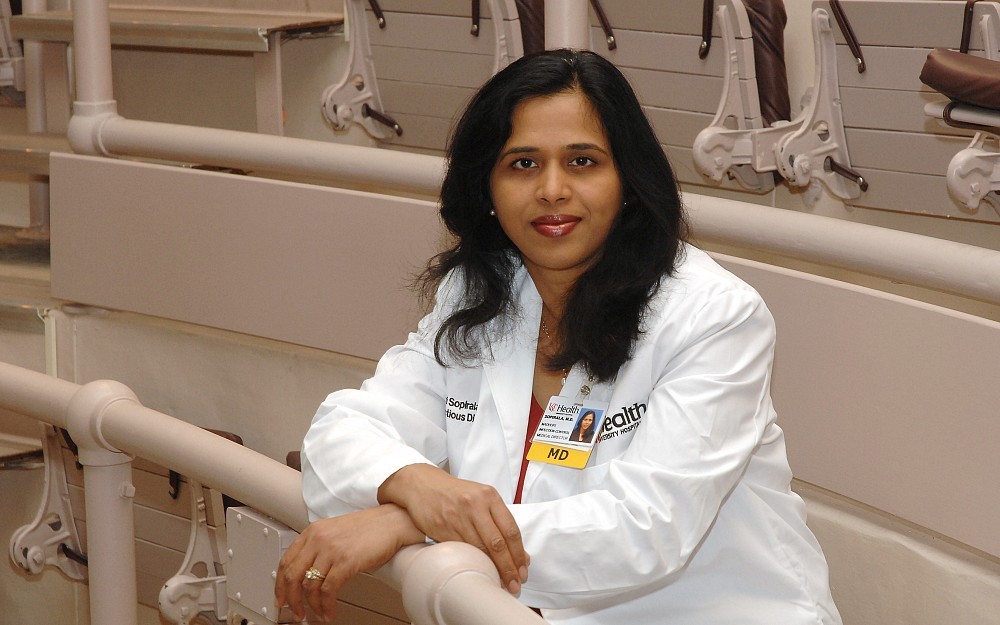
HEALTH LINE: Take Precautions Against Meningitis
CINCINNATIRecent outbreaks of meningitis at Princeton University and other college campuses across the nation have students on alert, but there are ways to lessen the threat, says Madhuri Sopirala, MD, associate professor of infectious diseases at the University of Cincinnati and a UC Health physician.
"Meningococcal meningitis is spread through saliva usually, through sharing things such as glasses, cups, water, or eating from the same plate, sharing drinks or kissing, says Sopirala. "In addition to causing severe neurological problems, it can also cause blood stream infection, sepsis and organ damage.
Seven students and one student visitor at
have been sickened with meningitis since March and other cases have been reported at
University in West Long Branch, N.J. and at the
University of California at Santa Barbara
and
at Long Beach.
According to the
U.S. Centers for Disease Control and Prevention
, meningitis is a disease caused by the inflammation of the protective membranes covering the brain and spinal cord known as the meninges. The inflammation is usually caused by an infection of the fluid surrounding the brain and spinal cord. Meningitis can be caused by bacteria or viruses or physical injury, cancer or certain drugs, according to the CDC.
There are five types of meningitis, according to the CDC. At Princeton, there are confirmed cases of the bacterial meningitis due to Neisseria meningitidis serogroup (type) B, according to the
New Jersey Department of Health
. No deaths on college campuses have been reported as a result of meningitis.
"It is a very serious infection of your central nervous system and it can cause plenty of damage, says Sopirala. "About 10 percent of patients can go on to develop serious symptoms. It can be fatal.
Symptoms include fever, stiffness of the neck, body aches, headache, nausea, vomiting, confusion and sensitivity to light, according to the CDC.
Sopirala says students at UC and other local colleges and universities can take precautions against the disease by simply practicing good hygiene.
Many tips are spelled out by the
New Jersey Department of Health
, which says students can do the following:
Cover your mouth when coughing and sneezing with a tissue or sleeve.
Clean your hands before eating, using soap and water or alcohol-based hand rub.
Avoid sharing utensils, water bottles or other items contaminated by saliva or respiratory secretions.
Practice positive healthy habits such as avoiding smoking and excessive alcohol use. Eat healthy foods and get plenty of rest.
The outbreak has not affected UC, but should be taken seriously, says Sopirala.
"None of the cases at Princeton University are directly linked to each other and have been occurring for several months, she says. "It indicates an outbreak that could likely go on.
Officials at
are recommending that students take a vaccine to prevent the disease. The vaccine has been given special approval for use at Princeton by the U.S. Food and Drug Administration. It has not been licensed for use in the U.S. otherwise, but is used in Europe and Australia, according to the Princeton University website.
Tags
Related Stories
UC study: Brain organ plays key role in adult neurogenesis
July 2, 2024
The University of Cincinnati has published research in the Proceedings of the National Academy of Sciences that found the choroid plexus and cerebrospinal fluid play a key role in maintaining a pool of newly born neurons to repair the adult brain after injury.
Put down that beer; it's not a tanning lotion
July 1, 2024
The University of Cincinnati's Kelly Dobos joined WVXU's Cincinnati Edition to discuss what's fact and what's myth when it comes to sunscreen use, different kinds of sunscreen and a social media recommendation to use beer on your skin to help get a tan.
Cincinnati researchers want to know if MRIs can work better
June 28, 2024
WVXU and the Cincinnati Business Courier highlighted a new collaboration between the University of Cincinnati College of Medicine, UC Health GE HealthCare, JobsOhio, REDI Cincinnati and Cincinnati Children’s to create an MRI Research and Development Center of Excellence located on UC’s medical campus.
